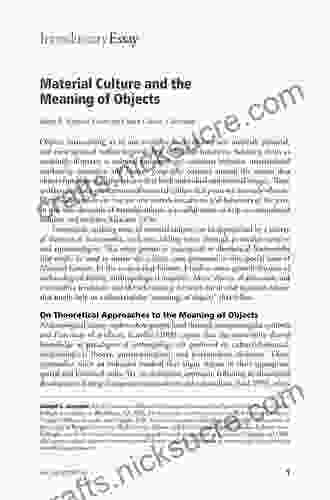The Cosmopolitan Tradition: A Noble but Flawed Ideal


The cosmopolitan tradition is a philosophical and political ideal that emphasizes the importance of global citizenship and a shared human identity. According to this view, all people are citizens of the world, and they should work together to create a more just and equitable society. The cosmopolitan tradition has its roots in ancient Greece, and it has been championed by philosophers and activists throughout history.
4.4 out of 5
| Language | : | English |
| File size | : | 2164 KB |
| Text-to-Speech | : | Enabled |
| Screen Reader | : | Supported |
| Enhanced typesetting | : | Enabled |
| Word Wise | : | Enabled |
| Print length | : | 310 pages |
The Origins of the Cosmopolitan Tradition
The term "cosmopolitan" comes from the Greek word "kosmopolitês," which means "citizen of the world." The concept of cosmopolitanism first emerged in ancient Greece, where philosophers such as Socrates, Plato, and Aristotle argued that all people are members of a single human community. This idea was further developed by the Stoic philosophers, who believed that all people are equal and should live in harmony with one another.
The cosmopolitan tradition was also influenced by the Roman Empire, which brought together people from all over the world. The Roman Empire was a melting pot of cultures, and it helped to spread the idea of a shared human identity.
The Cosmopolitan Tradition in Modern Times
The cosmopolitan tradition has continued to be influential in modern times. In the 18th century, Immanuel Kant argued that all people have a duty to promote world peace. In the 19th century, Karl Marx and Friedrich Engels argued that the working class is a cosmopolitan class that has no national boundaries.
In the 20th century, the cosmopolitan tradition was championed by thinkers such as Hannah Arendt, Jürgen Habermas, and Martha Nussbaum. These thinkers argued that cosmopolitanism is essential for creating a more just and equitable world.
The Benefits of Cosmopolitanism
The cosmopolitan tradition offers a number of benefits. First, it promotes global citizenship and a shared human identity. This can help to reduce prejudice and discrimination, and it can make the world a more tolerant and welcoming place.
Second, cosmopolitanism encourages cooperation and understanding between different cultures. This can help to prevent conflict and war, and it can make the world a more peaceful place.
Third, cosmopolitanism promotes social justice and equality. This can help to reduce poverty and inequality, and it can make the world a more fair and just place.
The Challenges of Cosmopolitanism
The cosmopolitan tradition also faces a number of challenges. First, it can be difficult to achieve in practice. The world is a complex and diverse place, and there are many different competing interests. It can be difficult to find common ground and to build consensus on how to create a more just and equitable world.
Second, cosmopolitanism can be seen as a threat to national sovereignty. Some people believe that cosmopolitanism undermines the authority of the state and that it leads to the loss of cultural identity.
Third, cosmopolitanism can be seen as a form of elitism. Some people believe that cosmopolitanism is only for the privileged few who have the luxury of traveling and interacting with people from different cultures.
The cosmopolitan tradition is a noble but flawed ideal. It offers a vision of a more just and equitable world, but it faces a number of challenges. Despite these challenges, the cosmopolitan tradition remains an important force for good in the world. It is a tradition that has the potential to make the world a better place, and it is a tradition that we should all strive to uphold.
4.4 out of 5
| Language | : | English |
| File size | : | 2164 KB |
| Text-to-Speech | : | Enabled |
| Screen Reader | : | Supported |
| Enhanced typesetting | : | Enabled |
| Word Wise | : | Enabled |
| Print length | : | 310 pages |
Do you want to contribute by writing guest posts on this blog?
Please contact us and send us a resume of previous articles that you have written.
 Fiction
Fiction Non Fiction
Non Fiction Romance
Romance Mystery
Mystery Thriller
Thriller SciFi
SciFi Fantasy
Fantasy Horror
Horror Biography
Biography Selfhelp
Selfhelp Business
Business History
History Classics
Classics Poetry
Poetry Childrens
Childrens Young Adult
Young Adult Educational
Educational Cooking
Cooking Travel
Travel Lifestyle
Lifestyle Spirituality
Spirituality Health
Health Fitness
Fitness Technology
Technology Science
Science Arts
Arts Crafts
Crafts DIY
DIY Gardening
Gardening Petcare
Petcare Abigail Hair
Abigail Hair Cosmas Inyang
Cosmas Inyang David Lipsky
David Lipsky Meg Keys
Meg Keys Robert Allans
Robert Allans Aliza Green
Aliza Green Corinne Andrews
Corinne Andrews Aaron Graves
Aaron Graves Christopher S Stewart
Christopher S Stewart Adam Kimelman
Adam Kimelman Aaron Mahnke
Aaron Mahnke Michael Johnson
Michael Johnson Aaron Mccargo
Aaron Mccargo Jeremy Paxman
Jeremy Paxman Abhishek V R
Abhishek V R Deborah Beck Busis
Deborah Beck Busis Lenyfer Garrido
Lenyfer Garrido Chris Jericho
Chris Jericho John Caig
John Caig Maya Lang
Maya Lang Bill Loguidice
Bill Loguidice Jennifer Ackerman
Jennifer Ackerman Jeremy Miles
Jeremy Miles Fred Fields
Fred Fields Timothy Phelps
Timothy Phelps Michael L Bloomquist
Michael L Bloomquist Zoyla Arana
Zoyla Arana Ron Hotchkiss
Ron Hotchkiss Arthur Turrell
Arthur Turrell Terry Palechuk
Terry Palechuk Lindsey Ellison
Lindsey Ellison Jeremy Shinewald
Jeremy Shinewald Stephen R Lawhead
Stephen R Lawhead Abigail Marshall
Abigail Marshall Emily K Neuburger
Emily K Neuburger Alicia Silverstone
Alicia Silverstone Adam H Balen
Adam H Balen Linda Sarris
Linda Sarris Vince Kotchian
Vince Kotchian T L Christianson
T L Christianson Sam J Miller
Sam J Miller Megan Lane
Megan Lane Renda Dionne Madrigal
Renda Dionne Madrigal William Hamilton Gibson
William Hamilton Gibson Sam Jarman
Sam Jarman Richard Martin
Richard Martin Axie Oh
Axie Oh David Simon
David Simon Jessica Hepburn
Jessica Hepburn Aaron Oster
Aaron Oster Andrew Skurka
Andrew Skurka Emily J Taylor
Emily J Taylor Lisa M Given
Lisa M Given Irene Lewis Mccormick
Irene Lewis Mccormick Sean Lewis
Sean Lewis Sissy Goff
Sissy Goff David G Brown
David G Brown Brian Hoggard
Brian Hoggard Mark Januszewski
Mark Januszewski Winifred Conkling
Winifred Conkling Taylan Hoca
Taylan Hoca Lucy Letcher
Lucy Letcher Tomi Adeyemi
Tomi Adeyemi Steve Rosenberg
Steve Rosenberg Kim Gosselin
Kim Gosselin Alicia C Simpson
Alicia C Simpson Elena Aguilar
Elena Aguilar Aaron James
Aaron James Adam Chandler
Adam Chandler Carolyn Jessop
Carolyn Jessop Lee Sandlin
Lee Sandlin Lynn E Ponton
Lynn E Ponton Lisa Pineda
Lisa Pineda Jack Cavanaugh
Jack Cavanaugh An American Citizen
An American Citizen Anthony Wilkenson
Anthony Wilkenson Ryan Smithson
Ryan Smithson Debbie Ford
Debbie Ford Randy Walker
Randy Walker Walter Browder
Walter Browder Chashiree M
Chashiree M Tamora Pierce
Tamora Pierce Aaron Reed
Aaron Reed Marc Dando
Marc Dando Emily Suzanne Clark
Emily Suzanne Clark Susan Walton
Susan Walton Dr Robert Pasahow
Dr Robert Pasahow Xiuhtezcatl Martinez
Xiuhtezcatl Martinez Andrea M Nelson Royes
Andrea M Nelson Royes Dmv Test Bank
Dmv Test Bank Charles C Patrick
Charles C Patrick Matt Warshaw
Matt Warshaw Adam Koch
Adam Koch Alvin Alexander
Alvin Alexander Jon Butterworth
Jon Butterworth Zoe Hamlet Silva
Zoe Hamlet Silva Collins Kids
Collins Kids Louise Pickford
Louise Pickford Roman Dial
Roman Dial Phong Thong Dang
Phong Thong Dang Ann Frederick
Ann Frederick Abdul Foster
Abdul Foster Maureen Duffin Ward
Maureen Duffin Ward Larry Carpenter
Larry Carpenter Todd Graves
Todd Graves Bathroom Readers Institute
Bathroom Readers Institute Jasna Tuta
Jasna Tuta Horace Kephart
Horace Kephart Tony Soper
Tony Soper Joe Simpson
Joe Simpson Lynn Rush
Lynn Rush Christopher Monahan
Christopher Monahan Achille Rubini
Achille Rubini Paul Chiasson
Paul Chiasson Jay Dawes
Jay Dawes Ada Calhoun
Ada Calhoun Adam Lazarus
Adam Lazarus Gloria Atanmo
Gloria Atanmo Stacy Eaton
Stacy Eaton Kit Bauman
Kit Bauman Daphne Poltz
Daphne Poltz Jacob Neumann
Jacob Neumann Abigail Melton
Abigail Melton Devika Primic
Devika Primic Alan Robertson
Alan Robertson Gayle Forman
Gayle Forman Mikki Daughtry
Mikki Daughtry Ian Mcleod
Ian Mcleod Sophie Mccartney
Sophie Mccartney Laurence Steinberg
Laurence Steinberg Brandon Neice
Brandon Neice Kate Rope
Kate Rope Lisa M Schab
Lisa M Schab Abridged Ed Edition Kindle Edition
Abridged Ed Edition Kindle Edition Joy Neighbors
Joy Neighbors Scott Butler
Scott Butler Charlie Barker
Charlie Barker Kirk Bailey
Kirk Bailey Lavinia Collins
Lavinia Collins Bobby Reyes
Bobby Reyes Og Mandino
Og Mandino Paul Schneider
Paul Schneider Miriam Forman Brunell
Miriam Forman Brunell Claire Santry
Claire Santry Stephanie Puglisi
Stephanie Puglisi Ben Cohen
Ben Cohen Phil Boyle
Phil Boyle Sally Clarkson
Sally Clarkson Jim Willis
Jim Willis Gladys Chepkirui Ngetich
Gladys Chepkirui Ngetich Felice Fox
Felice Fox Bill Mckibben
Bill Mckibben James Heberd
James Heberd Man Kam Lo
Man Kam Lo Jimmy Houston
Jimmy Houston Al Desetta
Al Desetta Abinash Das
Abinash Das Charles H Kraft
Charles H Kraft Barry Dainton
Barry Dainton Clara Shaper
Clara Shaper Dan Morris
Dan Morris David Winner
David Winner Stephen Abbott
Stephen Abbott Lisa Latimer
Lisa Latimer James Surowiecki
James Surowiecki Drew Harris
Drew Harris Fumio Sasaki
Fumio Sasaki Jason Korol
Jason Korol Ilsa J Bick
Ilsa J Bick Martha Gellhorn
Martha Gellhorn Abigail Pogrebin
Abigail Pogrebin Annie Nicholas
Annie Nicholas Rose Ann Hudson
Rose Ann Hudson Christopher Black
Christopher Black Tim Jarvis
Tim Jarvis Ariana Eagleton
Ariana Eagleton Wayne Westcott
Wayne Westcott Gail Buckland
Gail Buckland Michael Gruenbaum
Michael Gruenbaum Sherri Granato
Sherri Granato Ian Davis
Ian Davis E P Marcellin
E P Marcellin Barbara Decker
Barbara Decker Rick Sekuloski
Rick Sekuloski Marvin Valerie Georgia
Marvin Valerie Georgia Christina Hoff Sommers
Christina Hoff Sommers Gil Capps
Gil Capps Kaylynn Flanders
Kaylynn Flanders Ed Engle
Ed Engle Heather Lynn
Heather Lynn Randi Hutter Epstein
Randi Hutter Epstein David Rensin
David Rensin Irakli Makharadze
Irakli Makharadze Iain Highfield
Iain Highfield Programming Languages Academy
Programming Languages Academy Adam Benshea
Adam Benshea Abraham Silberschatz
Abraham Silberschatz George J Hademenos
George J Hademenos Adam D Scott
Adam D Scott Amber Domoradzki
Amber Domoradzki Israel Finkelstein
Israel Finkelstein Leigh Bardugo
Leigh Bardugo Erika Fatland
Erika Fatland Thubten Yeshe
Thubten Yeshe Adam Galinsky
Adam Galinsky Charles Thomas Jr
Charles Thomas Jr Eduardo Duran
Eduardo Duran Farah Shabazz Ii
Farah Shabazz Ii Tom Jackson
Tom Jackson Monica Sorrenson
Monica Sorrenson Stefan Ball
Stefan Ball John Hancock
John Hancock Gerry Donohue
Gerry Donohue Rob Gray
Rob Gray Jenny Han
Jenny Han Gavin D J Harper
Gavin D J Harper Jennifer Greene
Jennifer Greene Abby Haight
Abby Haight John Kean
John Kean Sarah K L Wilson
Sarah K L Wilson Al Baird
Al Baird Seth Kugel
Seth Kugel Jack Moore
Jack Moore Aaron J Perry
Aaron J Perry Marlene Wagman Geller
Marlene Wagman Geller Christophe Jaffrelot
Christophe Jaffrelot Kristin Berry
Kristin Berry Louise Thaden
Louise Thaden Scott Shaw
Scott Shaw Rania Abouzeid
Rania Abouzeid Genius Reads
Genius Reads Garrett Mcnamara
Garrett Mcnamara Kevin A Morrison
Kevin A Morrison Suzanne Corkin
Suzanne Corkin Lisa Robertson
Lisa Robertson Carley Roney
Carley Roney Abbi Glines
Abbi Glines Andrew Campanella
Andrew Campanella Aaron Hahn
Aaron Hahn Jeff Bauman
Jeff Bauman Abigail Hing Wen
Abigail Hing Wen Katrina Kahler
Katrina Kahler Arthur Atchabahian
Arthur Atchabahian Achref Hassini
Achref Hassini Tom Migdalski
Tom Migdalski Tali Edut
Tali Edut Pat Chargot
Pat Chargot Debbie Elicksen
Debbie Elicksen William Deresiewicz
William Deresiewicz Allan Sand
Allan Sand Rolf Mowatt Larssen
Rolf Mowatt Larssen Andy Dumas
Andy Dumas Ken Springer
Ken Springer Michael Crawley
Michael Crawley Adam Boduch
Adam Boduch Stuart Firestein
Stuart Firestein M J Parisian
M J Parisian Mary Roach
Mary Roach Maxine Levaren
Maxine Levaren Ann Mariah Cook
Ann Mariah Cook J Robert King
J Robert King Christian Beamish
Christian Beamish David Warriner
David Warriner Chris Worfolk
Chris Worfolk Adam Freeman
Adam Freeman Sheldon Axler
Sheldon Axler Mark Strom
Mark Strom Nick Holt
Nick Holt Dan Werb
Dan Werb Abby Mcallister
Abby Mcallister Cornel West
Cornel West Ron Jones
Ron Jones Abdelkader Nouiri
Abdelkader Nouiri Rachel Caine
Rachel Caine Lin Wellford
Lin Wellford Sheri Van Dijk
Sheri Van Dijk Scott Meyers
Scott Meyers Stephen Brennan
Stephen Brennan Claire Ahn
Claire Ahn Richard Lighthouse
Richard Lighthouse Laurie Chaikind Mcnulty Lcsw C
Laurie Chaikind Mcnulty Lcsw C Ralph Villiger
Ralph Villiger Jane Gross
Jane Gross Vikas Kakwani
Vikas Kakwani Melodie M Davis
Melodie M Davis Baba Ifa Karade
Baba Ifa Karade Matt Owens
Matt Owens Aaron Blight
Aaron Blight Christopher Knight
Christopher Knight Emma Crewe
Emma Crewe Betsy Miller
Betsy Miller Jim Morekis
Jim Morekis Darrin Bergman
Darrin Bergman Caroline Kaufman
Caroline Kaufman Peter Harrison
Peter Harrison Rosie Pope
Rosie Pope Abu Mussab Wajdi Akkari
Abu Mussab Wajdi Akkari Kathy Koch Phd
Kathy Koch Phd Charles Fernyhough
Charles Fernyhough Colin Hunter
Colin Hunter Dawson Church
Dawson Church Abbey Curran
Abbey Curran Adam J Rosh
Adam J Rosh Winston Chang
Winston Chang Brian L Gorman
Brian L Gorman Sharon Boyd
Sharon Boyd Nancy Mohrbacher
Nancy Mohrbacher Amby Burfoot
Amby Burfoot Paula Deen
Paula Deen Adam J Cox
Adam J Cox Tomos Forrest
Tomos Forrest Aaron Lee Johnson
Aaron Lee Johnson Al Yellon
Al Yellon Steve Roper
Steve Roper Papus
Papus Vivian Gussin Paley
Vivian Gussin Paley Sasha Abramsky
Sasha Abramsky Lois G Schwoerer
Lois G Schwoerer Conrad Bauer
Conrad Bauer Tom Rosenbauer
Tom Rosenbauer Gisle Solhaug
Gisle Solhaug Harley Rustad
Harley Rustad Elisabetta Viggiani
Elisabetta Viggiani Abby Sunderland
Abby Sunderland Marie Cirano
Marie Cirano Domenica Marchetti
Domenica Marchetti Laura Gao
Laura Gao Dan Shideler
Dan Shideler Kemi Iwalesin
Kemi Iwalesin Jennifer Finney Boylan
Jennifer Finney Boylan Steve Mcmenamin
Steve Mcmenamin Abigail Owen
Abigail Owen Cassandra Eason
Cassandra Eason Daniel Carter Beard
Daniel Carter Beard Uri Bram
Uri Bram Katie Lear
Katie Lear Erik Scott De Bie
Erik Scott De Bie Kayla Cottingham
Kayla Cottingham Michelle Hodkin
Michelle Hodkin Adam Enaz
Adam Enaz Michelle Obama
Michelle Obama Kel Carpenter
Kel Carpenter Barbara Fox
Barbara Fox Richelle Mead
Richelle Mead Adam Becker
Adam Becker Catherine Ryan Hyde
Catherine Ryan Hyde Abby Hafer
Abby Hafer Benjamin Roberts
Benjamin Roberts Glen Finland
Glen Finland Christopher Pike
Christopher Pike Brad Brewer
Brad Brewer Stephen A Mitchell
Stephen A Mitchell Douglas W Hubbard
Douglas W Hubbard Shannon Hale
Shannon Hale Justin Driver
Justin Driver Carl Jones
Carl Jones Abigail Alling
Abigail Alling Pearson Education
Pearson Education Shari Eskenas
Shari Eskenas Goodman Publishing
Goodman Publishing Carl Vernon
Carl Vernon Paul Mclerran
Paul Mclerran George John Romanes
George John Romanes Judi Kesselman Turkel
Judi Kesselman Turkel Blake D Bauer
Blake D Bauer Dick Edie
Dick Edie Scott Carney
Scott Carney Jay Ruud
Jay Ruud Michel Roy
Michel Roy Laura Peyton Roberts
Laura Peyton Roberts Brian Greene
Brian Greene Lynn Alley
Lynn Alley Asato Asato
Asato Asato Linford Stutzman
Linford Stutzman Tom Mccarthy
Tom Mccarthy Gerald A Voorhees
Gerald A Voorhees Gregor Clark
Gregor Clark Alexander Nehamas
Alexander Nehamas Michael N Mitchell
Michael N Mitchell Abigail Tucker
Abigail Tucker Curt Lader
Curt Lader Helen C Rountree
Helen C Rountree Richard Sattora
Richard Sattora Sarah Maslin Nir
Sarah Maslin Nir Achusim Michael
Achusim Michael Chella Quint
Chella Quint Ronald Kaine
Ronald Kaine Aiden Thomas
Aiden Thomas Tim Larkin
Tim Larkin Miranda Kenneally
Miranda Kenneally Peter David
Peter David Gary Sakuma
Gary Sakuma Ned Johnson
Ned Johnson Hillary Allen
Hillary Allen Reinette Biggs
Reinette Biggs Neil Oliver
Neil Oliver R L Stine
R L Stine Virginia Smith Harvey
Virginia Smith Harvey Steven Alan Childress
Steven Alan Childress John Taylor
John Taylor Rex Ogle
Rex Ogle Shuai Huang
Shuai Huang Bruce Van Brunt
Bruce Van Brunt Chaz Scoggins
Chaz Scoggins Edward J Larson
Edward J Larson Rachael Ray
Rachael Ray Charles L Byrne
Charles L Byrne Eze Ugbor
Eze Ugbor Craig Timberg
Craig Timberg Agustin Fuentes
Agustin Fuentes Abbas Kazerooni
Abbas Kazerooni Michael Egan
Michael Egan Steve Griffith
Steve Griffith Casey Robson
Casey Robson Mary Wong
Mary Wong Hans C Ohanian
Hans C Ohanian Beth Newell
Beth Newell Peter Sagal
Peter Sagal Sorin Dumitrascu
Sorin Dumitrascu Alifya And Umesh Mohite
Alifya And Umesh Mohite Helen Scales
Helen Scales T L Lowery
T L Lowery Kenn Kaufman
Kenn Kaufman Carmen Moreno
Carmen Moreno Laura Sebastian
Laura Sebastian Teresa Finney
Teresa Finney Achim K Krull
Achim K Krull Liza Angela
Liza Angela Sarah Moore
Sarah Moore Amelia Whitmore
Amelia Whitmore Lillian Cumic
Lillian Cumic O Thomas Gift
O Thomas Gift Moon Ho Jung
Moon Ho Jung Jennifer L Hunt
Jennifer L Hunt Robert Reid
Robert Reid Jeremy Roenick
Jeremy Roenick Laura Ray
Laura Ray P S Page
P S Page Sean Mcmanus
Sean Mcmanus Stephanie Zeiss
Stephanie Zeiss Aaron Reed Msn Crna
Aaron Reed Msn Crna Barbara Natterson Horowitz
Barbara Natterson Horowitz Lucio Russo
Lucio Russo Phil Gaimon
Phil Gaimon Sarah Luddington
Sarah Luddington Amber Fox
Amber Fox Al Barkow
Al Barkow Stephen Gray
Stephen Gray Andy Couturier
Andy Couturier Richard Langer
Richard Langer Pamela Druckerman
Pamela Druckerman Martha C Nussbaum
Martha C Nussbaum Sheila Lamb
Sheila Lamb Scott Parsons
Scott Parsons Adam Lashinsky
Adam Lashinsky Thomas Wilson
Thomas Wilson Garo Yepremian
Garo Yepremian John D Gordon
John D Gordon Barbara A Lewis
Barbara A Lewis Brigitte Jordan
Brigitte Jordan Barry Robinson
Barry Robinson G Bailey
G Bailey Norton Juster
Norton Juster Vivienne Sanders
Vivienne Sanders Randall Hyde
Randall Hyde David Feddes
David Feddes Rory Miller
Rory Miller Eugene H Merrill
Eugene H Merrill Adam Braus
Adam Braus Chuck Callaway
Chuck Callaway Lisa Heffernan
Lisa Heffernan Susan Zeppieri
Susan Zeppieri Natasha Preston
Natasha Preston Robert Fritz
Robert Fritz Ken Retallic
Ken Retallic Deborah Madison
Deborah Madison Chiara Giuliani
Chiara Giuliani Jennifer Shannon
Jennifer Shannon Adam Frank
Adam Frank Michael Baigent
Michael Baigent Jessie Hartland
Jessie Hartland
Light bulbAdvertise smarter! Our strategic ad space ensures maximum exposure. Reserve your spot today!

 Jamison CoxThink Don't Just Play Simple Tennis: Master the Mental Game to Elevate Your...
Jamison CoxThink Don't Just Play Simple Tennis: Master the Mental Game to Elevate Your... Shaun NelsonFollow ·16.7k
Shaun NelsonFollow ·16.7k Braden WardFollow ·11.2k
Braden WardFollow ·11.2k Gerald ParkerFollow ·17.7k
Gerald ParkerFollow ·17.7k Warren BellFollow ·13.7k
Warren BellFollow ·13.7k Michael CrichtonFollow ·4.5k
Michael CrichtonFollow ·4.5k Ralph Waldo EmersonFollow ·5.6k
Ralph Waldo EmersonFollow ·5.6k Edmund HayesFollow ·5k
Edmund HayesFollow ·5k Alexander BlairFollow ·17k
Alexander BlairFollow ·17k

 Doug Price
Doug PriceTracing the Evolution of Modern Psychoanalytic Thought:...
Psychoanalysis, once considered a radical...

 Devin Ross
Devin RossThe Digital Role Playing Game Approaches To Digital Game...
These are just a few of the many...

 F. Scott Fitzgerald
F. Scott FitzgeraldHistory from Things: Essays on Material Culture
History from Things:...

 Percy Bysshe Shelley
Percy Bysshe ShelleyThe Priest Lake Girl and the Cabin of Love: A True Story...
The Murder On...

 Isaiah Powell
Isaiah PowellThe Golf Mystic: Dick Edie's Unconventional Approach to...
In the annals of golf history, the name Dick...
4.4 out of 5
| Language | : | English |
| File size | : | 2164 KB |
| Text-to-Speech | : | Enabled |
| Screen Reader | : | Supported |
| Enhanced typesetting | : | Enabled |
| Word Wise | : | Enabled |
| Print length | : | 310 pages |











